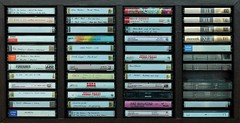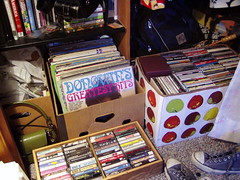Saturday, October 21, 2006
Cassettes for the Car and Walkman
It has been noted that not only do music recording formats become obsolete, but so to does the music. I had a major success in my thesis process last week when my ethics review went through with only one stipulation. That is, I will need the photos' original authors to sign off before I can publish them, but thankfully I will not be needing to publish the entire data set meaning I will only need to collect 20 to 50 approvals to have enough material to publish. So I have begun the process of selcting which images I will be using for my thesis, and some of the criteria for choosing them. This image is a good example of the kinds of pics I am looking to use. It has fairly large # of tapes (20 - 100), a variety or pre-recorded store bought and blanks. There is no creative commons liceneses issued on this image and there is a good selection of both notes and comments attched to it. Those will definately be some criteria.
Another revelation. Since I will be needing to contact photographers anyway to obtain their permission, I figured why not ask them to go the additional step and complete a short survey to give some detail and depth to my findings. (This is beginning to sound more and more like science all the time!)
Among the many questions I am brainstorming at the moment, are those realted to the content in a persons cassette collection compared to what they listen to now. How much have people replaced the music they listened to on cassettes, with its digital equivilant on either CD or MP3? I am curious if the kinds of music we listen to would have been different had the LP or compact cassette stuck around a little bit longer, which is something else that is likely impossible to track.
My cassette collection. Definitely some history here. I don't listen to some of this music any more. Growing up and having kids changes you.
Another revelation. Since I will be needing to contact photographers anyway to obtain their permission, I figured why not ask them to go the additional step and complete a short survey to give some detail and depth to my findings. (This is beginning to sound more and more like science all the time!)
Among the many questions I am brainstorming at the moment, are those realted to the content in a persons cassette collection compared to what they listen to now. How much have people replaced the music they listened to on cassettes, with its digital equivilant on either CD or MP3? I am curious if the kinds of music we listen to would have been different had the LP or compact cassette stuck around a little bit longer, which is something else that is likely impossible to track.
Thursday, October 05, 2006
New Records/Tapes/CDs
One great thing about a music collection is that it can be passed down, given away, lent or otherwise shared with other people. I suppose this is just as much a quality of physical "things" in general, but a signifignat collection has another precious aspect to it, the aspect of time. Seen here, the 70's , 80's and 90's have been represented not only in a musical chronology, but also through three seperate decades where three seperate media formats ruled. (painting with broad storkes here)
Over time, a collection of music matures, and depending on the care of the collector, the final accumulation can represent years or decades of effort on the part of the archivist. Varied musical trends and styles are often represented indicating both cultural and personal growth. In this case the collection also includes several different media formats.
Thinking how digital format music moves from one person to another is a different story. The entire physical aspect of time is lost, leaving the bare content itself, the music, to stand on its own, with its meager and most likely inconsistant metadata to back it up and provide some measure of date. There will be no worn edges, no scratches no muffled sounds or cracked cases in the digital world, and thats a good thing, the thing we all like.
Still, there is something nice in picking up an old album or tape and 'feeling' the age inherent through the physicality of the object. Whats that all about anyway?
Over time, a collection of music matures, and depending on the care of the collector, the final accumulation can represent years or decades of effort on the part of the archivist. Varied musical trends and styles are often represented indicating both cultural and personal growth. In this case the collection also includes several different media formats.
Thinking how digital format music moves from one person to another is a different story. The entire physical aspect of time is lost, leaving the bare content itself, the music, to stand on its own, with its meager and most likely inconsistant metadata to back it up and provide some measure of date. There will be no worn edges, no scratches no muffled sounds or cracked cases in the digital world, and thats a good thing, the thing we all like.
Still, there is something nice in picking up an old album or tape and 'feeling' the age inherent through the physicality of the object. Whats that all about anyway?

